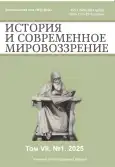Anglo-American discussion regarding the question of oil consession distribution in Iraq (1918–1928)
- Авторлар: Grishin N.O.1, Sagimbaev A.V.2
-
Мекемелер:
- Tsiolkovsky Kaluga State university
- Bryansk State university named after academician I.G. Petrovskiy
- Шығарылым: Том 7, № 1 (2025)
- Беттер: 126-134
- Бөлім: DEBATING ISSUES OF GENERAL HISTORY AND INTERNATIONAL RELATIONS
- URL: https://journal-vniispk.ru/2658-4654/article/view/292455
- DOI: https://doi.org/10.33693/2658-4654-2025-7-1-126-134
- EDN: https://elibrary.ru/GAANJT
- ID: 292455
Дәйексөз келтіру
Аннотация
The historiography of the problem of the evolution of international relations in the Middle East during interwar era as well as the impact of the oil factor on this particular matter consists an extensive number of studies. The scientific researches of the Soviet period, written with accordance to the principles of historical materialism and political economy, substantiated the paramount importance of the economic factor role towards the international situation, as well as the specificity of the socio-political model of development of the states in the region. Modern Russian historical science is attempting to reconsider Marxist tradition by applying the systematic approach and new methods of historical analysis. They are who made an important contribution to the study of the development of the oil industry in the Middle East, as well as to the theoretical explanation of the regional and international policy factors of the leading states in this period. Within the problem presented for consideration in this study, an attempt was made to highlight the main stages of the international dialogue around the issue of organizing oil extraction and redistribution of the oil products market in the territory of Mandate Iraq during the specified time period. The relations between two key subjects of the world politics of the interwar period, the USA and Great Britain, which became the leitmotif of the negotiation process on the issue of Iraqi oil, had a significant impact on the formation of the world political and economic conjuncture in the foreseeable time perspective. The scientific significance of the theme is derived from the need for a multilateral, complex study of the Anglo-American aspect of the Versailles-Washington system of international relations. Theoretical comprehension of these circumstances, in turn, seems promising in the field of identifying the underlying factors and reassessing the already known ones determined the evolution of Anglo-American relations in the period between the two world wars. In turn, the analysis of the diplomatic сooperation of the US and UK in the Middle East allows us to determine this region’s specific role in the overall structure of international affairs.
Негізгі сөздер
Толық мәтін
##article.viewOnOriginalSite##Авторлар туралы
Nikita Grishin
Tsiolkovsky Kaluga State university
Хат алмасуға жауапты Автор.
Email: GrishinNO@studklg.ru
SPIN-код: 2577-7807
postgraduate student, the department of World History
Ресей, KalugaAlexei Sagimbaev
Bryansk State university named after academician I.G. Petrovskiy
Email: sagimbaev@yandex.ru
SPIN-код: 4120-6343
Dr. Sci. (Hist.), Associate Professor, Head of the Department of World History and International Relationship
Ресей, BryanskӘдебиет тізімі
- Valiahmetova G.N. Oil and independence // To the history of disbandment of British mandate in Iraq 1928–1932/ ed. ed. V.V. Naumkin M.: Institute of Oriental Studies of RAS, 2009. P.220. EDN: QPOGET.
- Mokrova E.M. Impact of Sykes-Picot agreement on formation of modern map and oil business of Middle East region // Authority. 2023. V.31, No. 1. P. 213–219. doi: 10.31171/vlast.v31i1.9488. EDN: ZTOBWT.
- Savelyeva A.V. Discussions about US entry in Fist World War in American society (1914–1917) / Savelyeva. A.V., Soykin A.A. // Scientific dialog. 2022. V.11. No. 7. P.432–448. doi: 10.24224/2227-1295-2022-11-7-432-448. EDN: LLLIKU.
- Sokolov A.N. Reserves, production and consumption of fossil fuels in the world and in Russia // Oil and gas business. 2011. No 5. pp. 400–414. EDN: PDWJCD.
- Fursenco A.A. Rockfeller dynasty: The oil war (the end of 19th — beginning of 20th century). M.: «Delo» RANEPA, 2015. p. EDN: YVJDXW.
- Shchevelev. S.S. Mosul problem during period of British Mandate // Academic letters of Crimean Federal University named after V.I. Vernadskiy. Ser. Historical science, 2022. V.8. No. 1. P. 135–144. EDN: SSNOYL.
- Kaymaz.S. The Turkish Petroleum Company and the partition of Middle eastern oil // International Journal of Social Science, 2013. V. 6 I. 4. pp. 561–584. doi: 10.9761/JASSS1333.
- Ranjdar M. British Policy Towards the Government of the Mosul Vilayet, 1916–1926. University of Leicester, 2018. 230 p.
Қосымша файлдар








